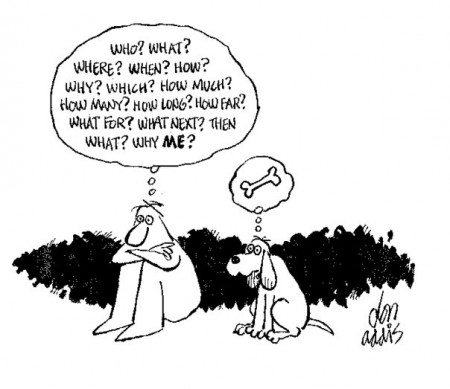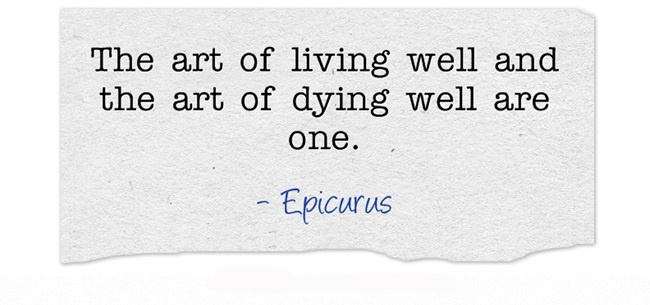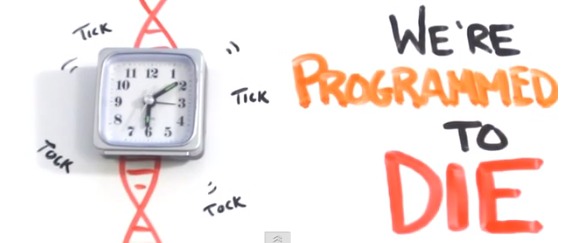Introduction
No doubt you will approach your death in your own way, bringing to the actively dying phase of life a uniqueness all your own. What follows are some of my personal thoughts on dying wisely and well.
I don’t want to suggest that any of this is either conclusive or absolute. It is not. You may find that some of the things suggested below are present in sequence in your dying, or none may be. Your dying process may take months or just hours. What you can count on is that, short of a miracle, you will need to be the one to take the lead in all of this. Those who attend and survive you, even some of your physicians and other health care providers, will need a mentor, and the person best situated for that role is you.
I present this idealized scenario at some risk of being misunderstood. This is not about adjusting your deathbed pillows so that you can strike heroic poses for the edification of onlookers. Rather it is about achieving a good and wise death in the context of real dying, with all its unpredictability, disfigurement, pain, and sorrow.
I advise you not to think about your dying process in terms of a schedule, where one event follows naturally from the one before.
Your dying, like the rest of your life, will no doubt be full of surprises. However, there are benchmarks that you should know about just in case they occur as you die.
Start with the things listed below as a baseline. You may find that some of these changes may begin to occur as early as three months before you actually die. Or you may find that your actively dying stage may begin as late as a week or even days prior to your death. The most important thing will be for you to heed the promptings of your mind and body. Hopefully these will signal you to begin a movement from struggling against dying to one of acceptance and acquiescence.
Please do not confuse acceptance and acquiescence with resignation and succumbing. Resignation and succumbing are passive, as in ‘something just overpowered me and I had no choice but to give up.’ Resignation is based in self-pity, believing that ‘in my dying I am powerless.’
Acceptance and acquiescence, on the other hand, are positive acts. ‘I choose to let go, to relinquish control and to accept living and dying for what they are.’ Wisdom comes in knowing when and where you are powerful and what the source of that power is.
One to Three Months Prior to Death – Turning Inward
By the time you realize you are actually dying, you will find that you have already begun to withdraw from the world around you. You will have less interest in the internet, newspapers or television, for example. You will invite fewer people to visit. In fact, you will probably have to practice saying, “Thank you, but I don’t feel like company today.”
 You will find that even the people dearest to you will begin to figure less and less prominently in your scheme of things. This process of detachment is good. It is a necessary component of the dying process and is precisely what will help make the inevitable separation easier on everyone involved.
You will find that even the people dearest to you will begin to figure less and less prominently in your scheme of things. This process of detachment is good. It is a necessary component of the dying process and is precisely what will help make the inevitable separation easier on everyone involved.
This is a time of turning inward and it can be a time of great insight for you. It will provide you an opportunity to sort things out, to evaluate yourself and the life you’ve lived. In other words, it can be a time to come to understanding about the meaning of your life and death.
Often this process is done with eyes closed, in a sort of meditation. It ought not to be confused with sleep, although your need for sleep will also increase at this time. You may add a morning nap to your usual afternoon nap. You may even be staying in bed all day and sleeping most of the time.
Those who attend you may not be attuned to the meaning of this inward turn and may become distressed. They may think it’s a sign of depression. It’s not. If you are able, try to reassure them that this is natural and that some quiet reflection on their part might bring them more into sync with you.
This inward turn will bring less of a need for verbal communication with others. Words are how living people communicate; touch and silence are how you will communicate as you die.
Rarely will you be able to count on those around you to understand this profound inward turn. Be patient with them. It’s not ill will; they’re just uninformed. An invitation for a loved one to embrace you can go a long way to calm both of you at this time.
Food and Nutrition
Food is fuel. You eat to live. As your body prepares to die, it needs less and less fuel. It is perfectly natural that your consumption of food will decrease and eventually stop. This is another very difficult concept for those who survive you to grasp. They will want you to eat, reasoning that eating will help you maintain your strength. You will need to help them understand that it is not food that will nourish you for what lies ahead, it is peace and serenity.
You will no doubt experience changes in your eating habits. Cravings will come and go. On some days nothing will taste good. On other days you may prefer liquids to solids. You will most likely eliminate hard-to-digest foods, like meat, from your diet first. Other foods will follow. And in time you will even choose to refuse soft foods.
It is okay not to eat. Eating just to please someone else will actually be counterproductive for you.
Look for Part 2 later in the week.


